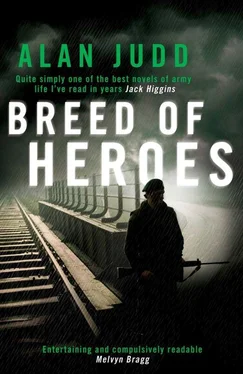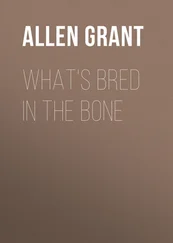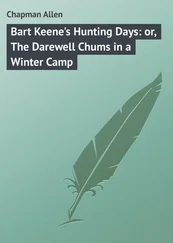‘Any time, Charlie. Just say.’
‘I’ll be in touch if he does. Remember — don’t come near us until you hear from me that it’s all right.’
When Charles told the CO what Beazely had said, the CO grunted and remarked: ‘Just shows you can’t trust these bloody pressmen. Always listening to other people’s conversations. Watch your step in future.’ Charles waited to hear that the Guards officer had been recalled, and his own name cleared. But he waited in vain. A few days later he asked the CO if the general was now aware of the source of the story, and added that Beazely was willing to testify to it. ‘The matter’s closed,’ said the CO. ‘No point in digging it up. You’ve learnt your lesson, I hope. Now shut up.’
Somewhat to his surprise, Charles found that he was writing two or three times a week to Janet. They were long outpourings, produced at speed and of a length and passion that he knew was not justified by the relationship. They were a self-indulgent rehearsal of all the things that preoccupied him, predominant among which was the question of how long he thought he could last in the Army. Sometimes he felt he could not last another day, at others that he could go on for ever. This latter mood was not the result of sudden enthusiasm so much as a growing inability to imagine himself doing anything else. Most of the people around him appeared to like what they were doing, and this imposed upon him a burden of silence, the only relief for which was letters to Janet. What made it worse was that he did not on the whole dislike the people he was with but did not know them well enough to discover whether the accumulation of sordid particulars and the inflexible but necessary attitudes of military life were as horrifying for them as for him. There were signs that the adjutant, in his weary cynicism, did not fully enjoy what he was doing; but never a word to say so. There were occasions when Anthony Hamilton-Smith showed a certain pained sensitivity. After spending nearly a whole day closeted with the quartermaster in an attempt to straighten out some arcane aspect of HQ company’s ration issue — an affair which had also engrossed the CO, the adjutant, the RSM and the paymaster — Anthony had yawned behind the back of the disgruntled quartermaster and remarked in an undertone to Charles, ‘That man, with all he stands for, shows us the essential horror of Army life. I sometimes wonder why I love it so dearly.’
All this, he realised, was a little unfair on Janet. Long though they were, his letters were not very explicit, and from her replies it was clear that either she saw what he was doing as something comparable with the battles of the Somme or she failed, not unreasonably, to see what he was complaining about. Since their meeting he felt more distant from her, and at the same time a desire to communicate with her more. Her letters were brisk, cheerful and hurried. She seemed to be enjoying herself in London. He telephoned her a few times, when the adjutant was out of the room, but found that that device did more to emphasise distance than to decrease it. After a while he confined his letters to accounts of the books he was reading and to descriptions of Belfast, making much of the dirt, and especially much of the fact that a jug of milk left by an open window would be speckled black in an hour.
His books were his real solace and fully justified his overweight kit. The more vividly colourful and imaginative they were and the more remote from his drab environment, the better. As a student he had always resisted Tolkien, as he had resisted most cults, but he felt free to read and enjoy him now. Even better was Mervyn Peake’s grotesque and sinister fantasy. He started reading those Shakespeare plays he did not know but then found that he was largely ignorant of those few he thought he did know, and so went to those instead. His one disappointment was Madame Bovary ; perhaps because style, like poetry, was what was lost in translation or perhaps because he read it only on duty in the deadest part of the night. So far as he could see, none of his brother officers read anything except newspapers.
Belfast was relatively peaceful during those few weeks. This was a time when a few shootings and a bomb or two comprised what the newspapers called ‘a quiet night in Belfast’. To the CO it was ‘this unbelievable lull’; he could not conceal his disappointment that nothing much was happening in the battalion area and frequently speculated aloud as to what ‘they’ were up to under cover of the lull. The sum of the CO’s speculations was that whatever was going to happen was going to be worse than anything so far and woe betide those who were unprepared. Irritably, he toured the companies shouting ‘Hard targets!’ at all and sundry, and demanding to know of nervous officers what they would do if he were shot dead now, at this instant, talking to them in the false security of the company location.
Routine in battalion HQ was hardly enjoyable, but it was a framework upon which an existence could be based. The two essential elements were the eight-hour watchkeeping stints in the ops room, which occurred three times a week, and the daily O Groups at 1700 hours, known as ‘prayers’. The CO insisted upon these whether there was need or no, convinced that they benefited the morale of the battalion. All the company commanders attended and all the officers in battalion HQ, plus the RSM who took notes of everything that was said, regardless of relevance. Edward, too, was a prolific scribe and Charles was able to confirm what he had long suspected — that Edward’s company briefings contained practically none of his own words. Even certain mannerisms which Charles had thought were peculiar to Edward were now seen to originate from the CO.
Henry Sandy had also to attend, usually pale and tired after his nightly debauch. Even the paymaster was brought in from some mysterious and, everyone suspected, comfortable place known as ‘the rear echelon’, which he shared with the quartermaster. On one memorable occasion Henry Sandy had to be woken, publicly, by the RSM. What little charm the proceedings had was graciously given by Anthony Hamilton-Smith, who had frequent baths and seemed never to be depressed, tired or irritable like other people. He usually arrived at the meetings last, with the CO, and often had to slip out early for reasons which were never explained. He sometimes made a few light-hearted comments but rarely addressed himself seriously to the business of the day, so that his presence was a welcome balance to the CO’s intense seriousness and the RSM’s and Edward’s furious scribblings.
The CO invariably sat at the front facing everyone else across a large desk, with a wall-map of the battalion area behind him. He had a long stick which was meant for pointing out things on the map but which he smashed against the map or down upon the desk in order to emphasise firmness of resolve, swiftness of action, or the importance of soldier-like behaviour. He usually began by expressing amazement that the lull had continued for another twenty-four hours, and then issued dire warnings for the next twenty-four. Mysterious A1 sources were said to have indicated that the time would be soon.
Nigel Beale would then have to stand and, with the aid of a much shorter stick, give the daily Intelligence summary. This comprised a description of what had happened in the past twenty-four hours, which everyone knew, and speculation as to what was in store for the next twenty-four, which no one believed. It frequently happened that Nigel had nothing to report and no reason to expect anything, but he was still expected to speak for ten minutes. Sometimes he announced that there would be searches, again on the basis of A1 information, but usually nothing was found. Had Nigel been less zealous and intense he might have had a more sympathetic audience; as it was, his awareness that he was preaching to the godless heathen made him more intense still. His one believer was the CO, and the CO would brook no criticism of Nigel’s daily chore, no matter how kindly meant. Occasionally, though, the predictable pattern of the O Groups was shaken when the CO would suddenly formulate a new rule about dress or procedure and then castigate everyone present for not having adhered to it.
Читать дальше












